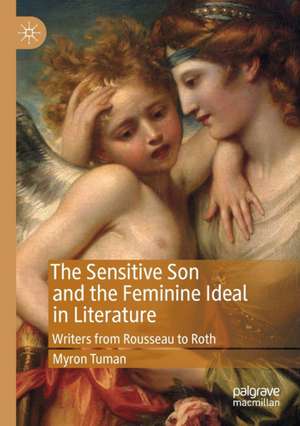The Sensitive Son and the Feminine Ideal in Literature: Writers from Rousseau to Roth
Autor Myron Tumanen Limba Engleză Paperback – 15 mai 2019
| Toate formatele și edițiile | Preț | Express |
|---|---|---|
| Paperback (1) | 419.43 lei 6-8 săpt. | |
| Springer International Publishing – 15 mai 2019 | 419.43 lei 6-8 săpt. | |
| Hardback (1) | 530.10 lei 6-8 săpt. | |
| Springer International Publishing – 22 mai 2019 | 530.10 lei 6-8 săpt. |
Preț: 419.43 lei
Nou
Puncte Express: 629
Preț estimativ în valută:
80.26€ • 85.82$ • 66.92£
80.26€ • 85.82$ • 66.92£
Carte tipărită la comandă
Livrare economică 17 aprilie-01 mai
Preluare comenzi: 021 569.72.76
Specificații
ISBN-13: 9783030157036
ISBN-10: 3030157032
Pagini: 269
Ilustrații: XII, 269 p. 1 illus.
Dimensiuni: 148 x 210 mm
Greutate: 0.37 kg
Ediția:1st ed. 2019
Editura: Springer International Publishing
Colecția Palgrave Macmillan
Locul publicării:Cham, Switzerland
ISBN-10: 3030157032
Pagini: 269
Ilustrații: XII, 269 p. 1 illus.
Dimensiuni: 148 x 210 mm
Greutate: 0.37 kg
Ediția:1st ed. 2019
Editura: Springer International Publishing
Colecția Palgrave Macmillan
Locul publicării:Cham, Switzerland
Cuprins
Chapter 1 Introduction - Hector’s Helmet.- Chapter 2 Getting Started - Roth, Proust, Freud, and Rousseau.- Chapter 3 The Adoring Son in Love, 1 - Rousseau.- Chapter 4 Another Stolen Ribbon - Mozart and Kierkegaard.- Chapter 5 The Sorrows of a Young Son - Goethe.- Chapter 6 Pygmalion in Love - Bernard Shaw.- Chapter 7 The Narcissist Son - Freud and da Vinci.- Chapter 8 The Masochist Son - Sacher-Masoch.- Chapter 9 The Uneasy Son - F. Scott Fitzgerald and D. H. Lawrence.- Chapter 10 The Bachelor Son - Stendhal and Schopenhauer.- Chapter 11 The Sensitive Son’s Midlife Crisis - Hazlitt and Rousseau.- Chapter 12 The Dutiful Son - Flaubert.- Chapter 13 The Adoring Son in Love, 2 - Turgenev.- Chapter 14 The Sensitive Son in Old Age - Rousseau.
Notă biografică
Myron Tuman was a professor of English at universities in West Virginia, Alabama, and Louisiana. This work on male writers and their mothers follows earlier studies of male writers and their sons, Melville’s Gay Father, and female writers and their fathers, Don Juan and His Daughter.
Textul de pe ultima copertă
This book considers major male writers from the last three centuries whose relation to a strong, often distant woman—one sometimes modeled on their own mother—forms the romantic core of their greatest narratives. Myron Tuman explores the theory that there is an underlying psychological type, the sensitive son, connecting these otherwise diverse writers. The volume starts and ends with Jean-Jacques Rousseau, whose Confessions provides an early portrait of one such son. There are chapters on other adoring sons, Stendhal, Sacher-Masoch, Scott Fitzgerald, and Turgenev, as well as on sons like Bernard Shaw and D.H. Lawrence with a different, less affectionate psychological disposition toward women. This book demonstrates how, despite many differences, the best works of all these sensitive sons reflect the deep, contorted nature of their desire, a longing that often seems less for an actual woman than for an elusive feminine ideal.
Caracteristici
Contributes to the study of psychology, gender, and masculinity Explores the archetype of the submissive son and draws on biographical and fictional sources Utilizes analysis of Jean-Jacques Rousseau as the prime example of the submissive son
